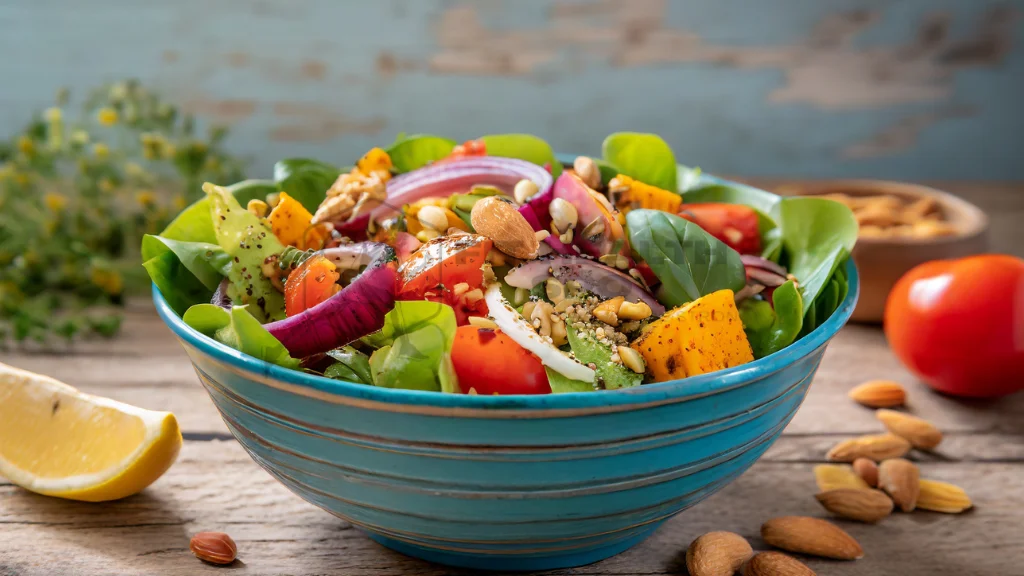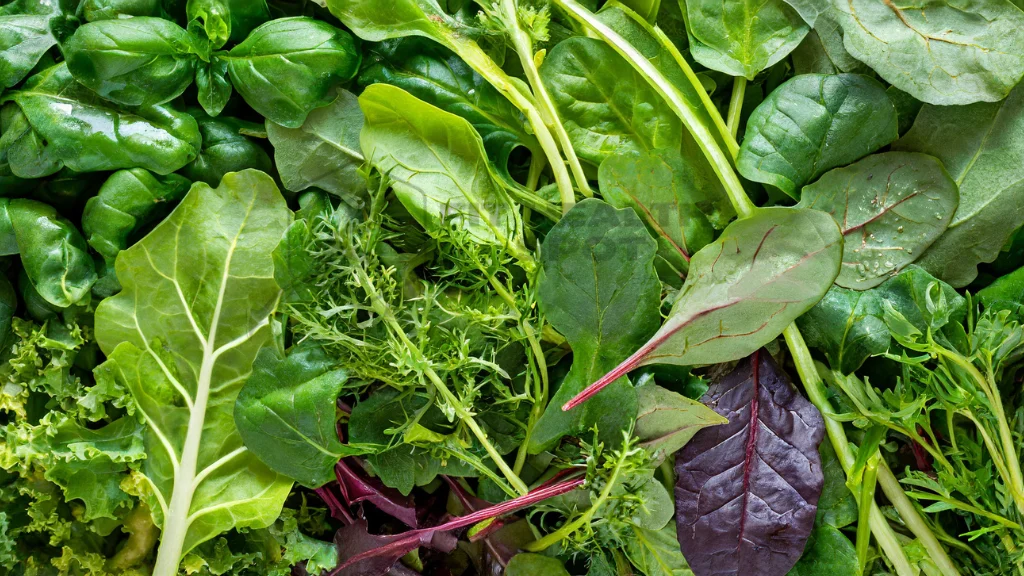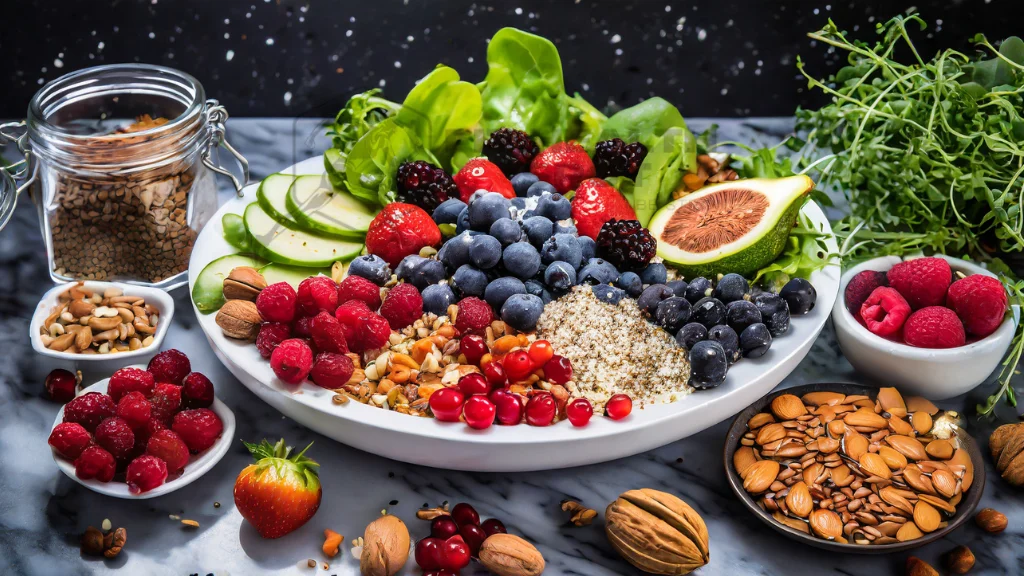Introduction

Welcome to a world where health meets taste! Salads, often underestimated, are powerhouses of nutrition and flavour, perfectly aligning with the needs of health-conscious individuals. In our fast-paced lives, finding the balance between delicious and nutritious can be a challenge, and that’s where salads come into play. They are not just a medley of greens and vegetables; they are a canvas for creativity, a celebration of textures and flavours, and a testament to the art of healthy eating.
In this all-encompassing manual, we’ll set forth on an illuminating exploration, revealing the “25 Remarkable Health Advantages of Consuming Salad.” Whether you are looking to enhance your diet, manage your weight, or simply add a splash of colour and vitality to your meals, salads offer an abundance of benefits that cater to all these needs and more. From their role in weight management to their surprising impact on mental health, salads are about to reveal their secrets.
As we dive into the depths of what makes salads an essential part of a balanced diet, we invite you to join us in discovering how these vibrant dishes do more than just please the palate – they nourish the body, mind, and soul. Get ready to explore how the simple act of tossing together a few fresh ingredients can transform your health in ways you never imagined!
Stay tuned as we unfold the numerous health benefits, practical tips, and delicious secrets that make salads an indispensable ally in your journey towards a healthier, happier life.
What Makes a Salad Healthy?
Exploring the Key Components of Nutritional Powerhouses
When we think of salads, the first image that often comes to mind is a bowl of leafy greens. However, the essence of what makes a salad genuinely healthy goes far beyond just a pile of lettuce. A skillfully assembled salad is a harmonious blend of elements that not only delight your palate but also deliver a nutritional boost. Here, we delve into the key components that elevate a salad from a mundane side dish to a nutritious main course.
Diverse Greens as a Foundation
- Variety is Vital: Start with a variety of greens like spinach, kale, arugula, and romaine. Each brings its unique set of nutrients, from iron and calcium to vitamins A, C, and K.
- Colorful is Nutritious: The deeper the colour, the richer the nutrient content. Leafy greens that are dark in colour are rich in antioxidants and vital vitamins.

Protein-Packed Additions
- Lean and Mean: Incorporate lean proteins such as grilled chicken, tofu, or legumes. These proteins help in muscle building and keep you satiated longer.
- Seafood for Omega-3s: Salmon or tuna not only imparts taste but also supplies essential omega-3 fatty acids, vital for the well-being of the heart and brain.
Crunchy Vegetables and Fruits
- Rainbow of Nutrients: Add a variety of vegetables like bell peppers, cucumbers, and carrots. Don’t shy away from fruits like berries or apple slices for a natural sweetness.
- Fiber and Antioxidants: These ingredients are high in fibre and antioxidants, aiding digestion and combating free radicals.
Healthy Fats for Absorption
- The Good Oils: Opt for dressings made with olive oil or avocado oil, known for their heart-healthy fats.
- Nuts and Seeds: Sprinkle some almonds, chia seeds, or flaxseeds for an extra dose of healthy fats and texture.
Mindful of Dressings
- Homemade Is Best: Create your dressings with natural ingredients to control sugar and salt intake.
- Less Is More: Use dressings sparingly. The goal is to enhance, not overpower, the natural flavours and nutrients of your salad.
Portion Control
- Balance Is Key: Even healthy salads can become calorie-dense with oversized portions. Be mindful of the quantity of each ingredient, especially high-calorie items like cheese and nuts.
In conclusion, a healthy salad is all about balance and variety. It’s a mix of different colours, textures, and nutrients that come together to form a wholesome and satisfying meal. By paying attention to the ingredients and portions, you can transform a simple salad into a nutrient-dense, health-boosting delight that keeps your taste buds and body happy.
Stay tuned as we dive into the “25 Outstanding Health Benefits of Salad” in our next section, where we reveal how this humble dish can be a game-changer for your health!
25 Health Benefits of Salad
Embarking on a Journey of Nutritional Discovery
Salads, often seen as a simple side dish, are, in reality, a cornerstone of a health-conscious lifestyle. In this extensive exploration, we are about to unveil the remarkable array of health benefits that salads offer. From enhancing physical well-being to supporting mental health, the humble salad is a powerhouse of nutrition and health advantages.
As we delve into this journey, we will uncover “25 Health Benefits of Salad,” each revealing a unique aspect of how this versatile dish can be a game-changer in your daily diet. These benefits are not just about the nutrients they provide; they are a testament to the integral role salads play in promoting a balanced, healthy lifestyle.
Tay tuned as we begin our exploration with the first of these 25 benefits, each carefully researched and presented to provide you with insights into the transformative power of salads. Whether you’re a seasoned salad lover or new to the world of greens and veggies, this journey is sure to enlighten and inspire a deeper appreciation for this essential element of healthy eating.
Harnessing the Power of Salads for a Healthier You
One of the most celebrated benefits of salads is their role in weight management. A bowl of salad provides significant nutritional benefits while keeping calorie intake low, making it a perfect option for individuals aiming to shed or manage their weight. The key lies in the fibre-rich greens and vegetables that form the bulk of any salad. Fibre not only promotes satiety but also aids in digestion, ensuring that you feel full longer and reducing the urge to indulge in unhealthy snacks. For example, incorporating ingredients like spinach, which is low in calories but high in fibre, can significantly aid in weight control. Additionally, the versatility of salads means you can create satisfying meals without sacrificing flavour or nutrition, which is crucial for sustainable weight management.
For more insights into nutritious ingredients that can enhance your salads and health, explore our detailed guide on Shallots: Benefits, Recipes, and Comparisons.
The Bounty of Nutrients in Every Bite
Salads are more than just a mix of greens; they are a treasure trove of essential nutrients. Every ingredient in a salad contributes to its nutritional profile. Kale and spinach, being leafy greens, are abundant in vitamins A, C, and K, along with minerals such as iron and calcium. Adding colourful vegetables such as bell peppers and carrots increases the intake of antioxidants and vitamins. Additionally, adding nuts or seeds to your diet can supply a beneficial amount of omega-3 fatty acids and protein. For example, a bowl of mixed greens salad can contribute substantially to your daily vitamin needs, as well as provide essential nutrients.
To discover more about unique and healthy ingredients, check out our comprehensive guide to Glass Noodles.
Salads as a Shield for Your Health
Our body relies on the immune system to protect against infections and diseases, and salads can play a significant role in maintaining its strength. The rich variety of vitamins and minerals found in salads, especially those high in vitamin C, like citrus fruits and leafy greens, play a pivotal role in enhancing immune function. Regular consumption of salads ensures a steady supply of these nutrients, bolstering the body’s natural defence mechanisms. For instance, a salad containing citrus fruits, rich in vitamin C, can significantly boost the immune system.
For more unique ways to enhance your diet, take a look at our in-depth exploration of Gorgonzola Cheese.
The Protective Role of Salads in Your Diet

Salads contribute significantly to cancer prevention, a benefit backed by numerous studies. The antioxidants present in various salad ingredients have the potential to reduce the risks of different types of cancer, like lycopene in tomatoes and beta-carotene in carrots. These antioxidants actively fight against free radicals, preventing cell damage that could otherwise result in cancer. Moreover, salads containing abundant fibre are linked to a decreased likelihood of developing colorectal cancer. Integrating a variety of salads into your diet can be a delicious and natural way to help protect yourself against this serious health concern.
Salads: A Heart’sHeart’s Best Friend
The heart, our vital organ, thrives on the nutrients that salads provide. Ingredients commonly found in salads, such as leafy greens, nuts, and seeds, are rich in antioxidants, fibre, and healthy fats – all of which are essential for maintaining good cardiovascular health. These elements collaborate to diminish arterial plaque, decrease levels of harmful cholesterol, and enhance blood circulation. For instance, incorporating a simple olive oil-based dressing can provide healthy fats that are beneficial for heart health. Regular consumption of a variety of salads can be a delicious way to support heart health and reduce the risk of heart disease.
Discover more heart-healthy foods in our guide on Garlic Cloves: Health Benefits and Uses.
Enhancing Digestive Health with Every Salad
The impact of salads on digestion is profound and positive. The high fibre content in salad ingredients like leafy greens and raw vegetables aids in smooth digestion and regular bowel movements, preventing constipation and promoting gut health. This fibre serves as a prebiotic, nourishing the friendly bacteria in the digestive tract, a crucial element for maintaining a well-functioning digestive system. Adding elements like lima beans to your salad can further enhance its fibre content, making it an even more effective digestive aid.
Learn more about nutrient-rich ingredients in our article on Lima Beans: Health Benefits and Nutritional Facts.
Radiant Skin Starts with Salads
Salads can be your skin’s best friend, thanks to their high content of vitamins, minerals, and hydration. Tomatoes, carrots, and leafy greens are rich in antioxidants and vitamins, protecting the skin against environmental damage and promoting skin repair and rejuvenation. The hydration provided by vegetables like cucumbers keeps the skin moisturized and glowing. Incorporating a salad with green papaya, for example, can bring the additional benefit of enzymes that promote skin health and youthfulness.
Dive deeper into the benefits of unique ingredients with our Green Papaya Comprehensive Guide.
Managing Cholesterol and Blood Pressure Naturally
Salads offer a natural solution to regulating cholesterol and blood pressure, two key factors in cardiovascular health. Foods such as avocados, nuts, and olive oil contain beneficial fats that assist in reducing levels of harmful cholesterol (LDL) while preserving desirable cholesterol (HDL) levels. Additionally, the potassium found in salad ingredients like leafy greens and tomatoes plays a crucial role in managing blood pressure levels. Regularly including salads in your diet can be an effective and enjoyable way to keep these vital health indicators in check.
Stabilizing Blood Sugar Levels with Salads
Salads play a crucial role in regulating blood sugar levels, making them an ideal meal choice for people with diabetes or those at risk. The majority of salad ingredients have a low glycemic index, preventing sudden increases in blood sugar. The presence of fibre in greens and vegetables hinders the rapid absorption of sugars into the bloodstream, maintaining a consistent blood sugar level. Leafy greens and cruciferous vegetables, in particular, excel in achieving this outcome. Adding a portion of high-fibre cavatappi pasta to a salad can also help in maintaining blood sugar levels.
For more on healthy ingredients, check out our article on Cavatappi Pasta: Health Benefits and Recipes.
A Salad a Day to Keep Strokes at Bay
Regular consumption of salads can significantly reduce the risk of stroke. This benefit is largely due to the high potassium content in many salad ingredients like spinach, avocado, and tomatoes. Potassium helps in managing blood pressure, a major risk factor for strokes. Moreover, the antioxidants and anti-inflammatory properties of various salad ingredients also contribute to overall vascular health, further reducing stroke risk. For an added stroke-prevention boost, consider incorporating green olives into your salads.
Explore the varieties and benefits of olives in Green Olives and Varieties: Benefits and Uses.
Nourishing the Brain with Salads
Salads can have a profound impact on neurological health, including the prevention of diseases like Alzheimer’sAlzheimer’s. Maintaining optimal brain health relies on the inclusion of antioxidants and omega-3 fatty acids from sources like leafy greens, nuts, and seeds in one’s diet. These nutrients play a crucial role in mitigating inflammation and oxidative stress, both of which are pivotal contributors to neurological diseases. Furthermore, specific components of salads boast abundant folate and other B vitamins, contributing to cognitive function and safeguarding against age-related brain disorders. Enhancing your salad with brain-boosting foods like green tea leaves can add to these benefits.
Learn more about the benefits of green tea in Green Tea Shots: Benefits and Secrets.
Building Stronger Bones with Every Salad
Salads contribute significantly to bone health. Ingredients high in calcium and vitamin K, such as kale, broccoli, and dairy-based dressings, are essential for maintaining strong and healthy bones. These nutrients collaborate to enhance bone density and guard against conditions such as osteoporosis. Additionally, the magnesium content in a variety of salad greens is essential for promoting bone health. It aids in enhancing the assimilation of calcium into the bones. Incorporating a variety of these ingredients into your salads ensures that you’re getting a balanced intake of all the essential nutrients for bone health.
Relieving Stress with the Right Salad Ingredients
Salads can be a natural stress-buster, thanks to specific ingredients known for their calming properties. Foods such as spinach and avocado are packed with magnesium, a mineral known for its ability to alleviate stress. Additionally, the incorporation of omega-3 fatty acids found in ingredients like smoked salmon has been linked to lowered anxiety and improved mood. The act of preparing and eating a fresh, colourful salad can also be a mindful practice, helping to alleviate stress.
Find out more about the benefits of smoked salmon in our Smoked Salmon Guide: Health Benefits and Recipes.
Boosting Energy with Nutritious Salads
Contrary to the belief that salads are light and not filling, they can be a significant source of sustained energy. Vegetables and whole grains like buckwheat offer a consistent energy release without the fluctuations linked to the consumption of simple sugars, thanks to the presence of complex carbohydrates. Adding protein-rich ingredients like chicken or beans further ensures that the energy from the salad is released slowly and consistently, keeping you energized throughout the day.
Learn more about nutritious grains in our comprehensive guide to Buckwheat Flour: Benefits and Uses.
Salads for a Sharper Mind
The impact of salads on cognitive function is profound. Ingredients rich in antioxidants, such as berries and leafy greens, protect the brain from oxidative stress, enhancing memory and concentration. Additionally, salads high in omega-3 fatty acids, vitamins, and minerals are known to improve cognitive abilities, and They might even lower the chances of cognitive decline in older adults. Including a variety of these ingredients in your daily salad can help keep your brain functioning at its best.
Natural Detox with Every Salad
Salads are an excellent way to detoxify the body. The high water content in vegetables like cucumbers and lettuce helps flush toxins from the body, while the fibre aids in cleansing the digestive tract. Ingredients such as lemon and beetroot in salads can further support liver function, a key organ in the body’s detoxification process. Regular consumption of a variety of salads ensures that you’re naturally supporting your body’s detox systems.
Combatting Inflammation with Nutrient-Rich Salads
Salads provide a tasty means to counteract the root cause of numerous chronic diseases, which is inflammation. Ingredients like leafy greens, tomatoes, and berries are rich in antioxidants and phytonutrients that have natural anti-inflammatory properties. Adding spices such as turmeric or ginger to your salad can further enhance its anti-inflammatory benefits. Consistently eating these nutrient-packed salads may aid in lowering inflammation across the body, promoting overall health and well-being.
Supporting Healthy Pregnancy with Nutritious Salads
During pregnancy, the importance of a nutrient-rich diet cannot be overstated, and salads are an excellent way to ensure that both mother and baby receive essential vitamins and minerals. Ingredients like spinach and carrots are high in folate, a vital nutrient for fetal development. Additionally, salads provide a substantial amount of fibre, which can help manage pregnancy-related digestive issues. Including a variety of colourful vegetables ensures a broad spectrum of nutrients, supporting a healthy pregnancy journey.
For more information on beneficial dietary practices, explore our guide on Intermittent and Dry Fasting: Health Benefits.
Ensuring Digestive Health with Fiber-Rich Salads
Salads are a boon for digestive health, primarily due to their high fibre content. Fibre encourages consistent bowel movements and guards against constipation, a prevalent digestive concern. Ingredients like leafy greens, cruciferous vegetables, and whole grains like oat bran contribute to the high fibre content of salads. Including a variety of these ingredients not only adds different textures and flavours but also ensures a healthy digestive system.
Find out more about the benefits of high-fibre ingredients in our detailed article on Oat Bran: Health Benefits and Nutritional Profile.
Salads: A Treasure Trove of Antioxidants
Antioxidants play a crucial role in fighting oxidative stress and preventing cell damage, and salads are an excellent source of these vital compounds. Berries, nuts, and dark leafy greens contain antioxidants like vitamins C and E, beta-carotene, and flavonoids. By adding a range of these ingredients to your salads, you guarantee a diverse array of antioxidants, providing protection against chronic diseases and promoting overall health and rejuvenation for your body.
Nourishing the Mind with Healthy Salads
The correlation between one’s diet and mental well-being is gaining more acknowledgement, with salads occupying a noteworthy position in fostering this connection. The presence of nutrients like omega-3 fatty acids, folate, and antioxidants in salads has been associated with enhanced mood and a decrease in symptoms related to depression and anxiety. Leafy greens and vibrant vegetables not only provide nourishment for the body but also support mental well-being by aiding in the production of neurotransmitters such as serotonin and dopamine.
Salads: A Refreshing Way to Stay Hydrated
Hydration is key to overall health, and salads are an excellent source of hydration. Ingredients such as cucumbers, lettuce, and tomatoes have high water content, contributing significantly to daily fluid intake. Eating a refreshing salad, especially during warmer months or after exercise, can help replenish fluids and keep the body hydrated. This aspect of salads is particularly beneficial as it supports all bodily functions, including circulation, digestion, and temperature regulation.
Promoting Restful Sleep through Salad Ingredients
Certain ingredients commonly found in salads can aid in improving sleep quality. Lettuce, for example, contains lactucarium, which has soothing properties and can promote better sleep. Nuts and seeds containing magnesium, a mineral that promotes muscle and nervous system relaxation, contribute to a more peaceful night’s sleep. Including these ingredients in your evening salad can be a natural way to enhance sleep quality, leading to better overall health and well-being.
Creating Delicious and Nutritious Salads
Mastering the Art of Tasty and Healthy Salads
Now that we’ve explored the plethora of health benefits salads offer let’s address a common question: “How to make a salad taste good?” The secret lies in balancing flavours, textures, and ingredients. Here are some practical tips and ideas to elevate your salad game:

- Vary Your Greens: Mix different types of greens like arugula, romaine, spinach, and kale for a variety of flavours and textures.
- Add a Protein Punch: Incorporate lean proteins like grilled chicken, tofu, or beans for a more filling salad.
- Play with Textures: Include crunchy elements like nuts, seeds, or crispy chickpeas and softer ingredients like avocados or roasted vegetables.
- Sweeten with Fruit: Fruits like berries, apple slices, or orange segments can add natural sweetness and vibrant flavours.
- Homemade Dressings: Create your dressings with healthy oils, vinegar, or citrus juices to control the flavour and nutritional content.
- Season Well: Don’t forget to season your salad with herbs, spices, or a pinch of salt to enhance the natural flavours.
For a simple yet delicious recipe, try a classic Spinach and Strawberry Salad:
- Toss fresh spinach leaves with sliced strawberries.
- Add a sprinkle of feta cheese and walnuts.
- Drizzle with a balsamic vinaigrette.
This combination offers a delightful mix of sweet and savoury flavours, perfect for a nutritious and satisfying meal.
Conclusion
Salads: A Cornerstone of Healthy Eating
In conclusion, salads are more than just an appetizer or side dishes; they are a vital component of a nutritious and balanced diet. From aiding in weight management to improving mental health, the benefits of incorporating salads into your daily routine are vast and varied. By understanding the key components that make a salad both healthy and delicious, you can enjoy these dishes in ways that cater to your taste preferences while reaping their numerous health advantages.

Remember, the journey to a healthier lifestyle doesn’t have to be bland. Salads offer a canvas for culinary creativity, allowing you to explore a world of flavours while nourishing your body. So, embrace the art of salad making, experiment with different ingredients, and enjoy the freshness and vitality that salads bring to your table.
For more insights into creating healthy and delicious meals, visit the Harvard School of Public Health’s guide on healthy eating, a credible resource filled with practical advice and nutritional information.
Embrace the diversity and richness of salads and let them be a daily delight in your journey towards a healthier, happier you.
Frequently Asked Questions (FAQs) About Salads and Their Health Benefits
Can eating salads really help in losing weight?
Absolutely! Salads play a vital role in a weight loss regimen because of their abundant fibre and low-calorie content. The fibre helps keep you full, reducing the need for high-calorie snacks between meals.
How can salads improve my digestive health?
Salads are rich in dietary fibre, which is essential for good digestion. Fiber aids in regular bowel movements and prevents constipation, promoting overall digestive health.
Are salads good for my skin?
Yes, they are. Salads packed with vitamins and minerals, especially those rich in vitamins C and E, can contribute to healthier, more radiant skin. These vitamins aid in skin repair and hydration.
Can salads actually affect my mental health?
Indeed, they can. The nutrients found in salads, such as omega-3 fatty acids, vitamins, and antioxidants, play a role in improving mood and reducing symptoms of mental health disorders like depression and anxiety.
What ingredients should I add to my salad for maximum health benefits?
For a nutritionally balanced salad, include a variety of leafy greens, colourful vegetables, lean proteins, healthy fats, and a source of complex carbohydrates. Don’t forget to add a mix of textures and flavours for enjoyment!
How do I make my salads taste better without adding too many calories?
Focus on homemade dressings with healthy oils and vinegar, add herbs and spices for flavour, and incorporate a mix of textures and natural sweetness from fruits.
Can salads help in managing chronic diseases?
Yes, salads can play a significant role in managing and preventing chronic diseases like heart disease, diabetes, and certain types of cancer, thanks to their high nutrient and antioxidant content.
Are there any foods I should avoid adding to my salad?
While salads are versatile, be mindful of high-calorie and high-fat additions like excessive cheese, creamy dressings, and fried toppings, which can diminish the health benefits.
How often should I eat salads to see health benefits?
Incorporating salads into your daily diet can offer the most benefits. Even a small salad as a side dish can contribute to your overall nutrient intake.
Can I rely solely on salads for my nutritional needs?
While salads are highly nutritious, they should be part of a varied diet to ensure all nutritional needs are met. It’s important to include a range of foods for a balanced diet.
